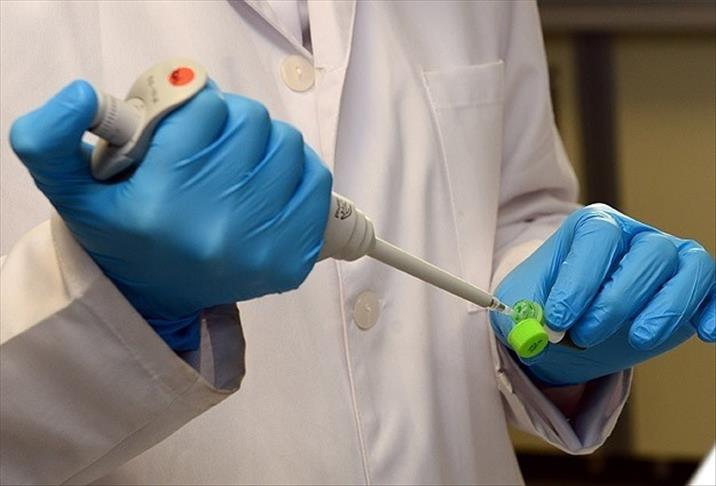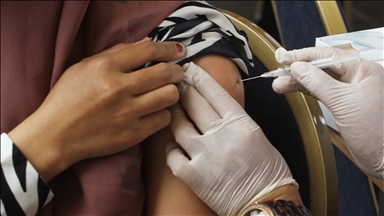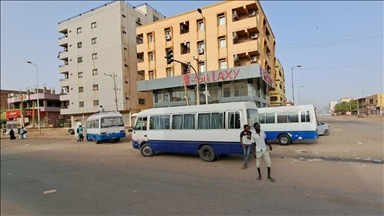
By Okech Francis
JUBA
The husband of 33-year-old Sharon Ben Apai left her when he discovered she had tested positive for HIV.
"When my husband heard I was HIV-positive, he left me. I have not heard from him since," Apai told The Anadolu Agency at Juba Teaching Hospital's antenatal care unit, where she goes for routine medical checkups.
She tested positive for HIV in September of last year, when she was two months pregnant.
"My relatives are currently trying to find out where he [her husband] is," Apai said.
Before her current pregnancy, she lost two of the four children she has had.
"When I tested positive, I didn't tell my husband," she said. "I don't know where he heard it, but he just ran away without getting tested."
Despite her difficult circumstances, Apai isn't alone.
Many pregnant women who have tested positive for HIV under the Prevention of Mother to Child Transmission (PMTCT) program have met with varying degrees of spousal abuse and/or neglect.
"Many women have reported varying degrees of violence. Some are beaten, chased away from home, or totally neglected by their husbands," Lucia Felentino, the medical officer in charge of the PMTCT department, told AA.
"This isn't a solution," she said. "Husbands, too, should come in for testing."
"It's not the end of the world; she will produce children free of HIV and they will live like other people. But the earlier they come in for testing the better," Felentino said.
The PMTCT is a government program that stipulates that pregnant women undergo HIV testing. Those who test positive are assisted in giving birth to HIV-negative children.
"About 30 percent of the HIV-positive mothers who seek our care deliver safely. Five percent of these deliver normally, without caesarean or other methods," Felentino said, noting that a total of 181 HIV-positive mothers successfully delivered last year alone.
Nevertheless, she lamented the high HIV rate among women.
"If you test 30 people, 5, 8 or 9 test positive. Every day we test, we get HIV-positive mothers, especially among foreigners [who get pregnant in South Sudan]," she noted.
She insisted, however, that – despite the challenges women meet at home – enrollment at the department was high.
"We have a lot of awareness about HIV," she said. "Our women now have a better understanding than previously. Now they ask for HIV tests."
The South Sudan AIDS Commission puts the country's HIV-positive population at just over 150,000.
HIV monitoring carried out in 2010 on 5,913 pregnant women by the AIDS Commission and its partners – at 24 antenatal sentinel sites across South Sudan – showed a 3-percent national HIV prevalence rate.
According to a public health risk assessment and interventions report issued by the World Health Organization (WHO) in January of last year, the epidemiology of HIV/AIDS in South Sudan was poorly documented and HIV prevalence among adults between the ages of 15 and 49 was estimated at 3.1 percent.
It pointed out that years of political instability and civil conflict in South Sudan had led to the deterioration of basic health services, thus weakening the national response to the HIV/AIDS epidemic.
The WHO report stressed that the biggest concerns had to do with the interruption of HIV treatment, drug resistance, antenatal care for HIV-positive women, the fate of displaced HIV patients, shortages of antiretroviral drugs, and the disruption of the supply of vital drugs and diagnostics.
Awareness
Felentino, for her part, said the PMTCT had managed to convince some husbands to come in for testing. If they tested positive, she said, they were enrolled for treatment – though this often came after a long struggle.
One such husband is John Oluko, who learned of his HIV-positive status in December of last year and who now accompanies his wife for regular antenatal checkups.
"It was terrible when I first learned she was HIV-positive," he told AA at the PMTCT department, where he had escorted his wife. "I could not imagine it; I was totally devastated."
"When she told me I was needed here [at the hospital], I first refused. But I finally came with her in January," he said.
"I know HIV isn't the end; I have learned to accept it," said Oluko. "I understand that – if you do what the doctor tells you – you won't die quickly."
He believes all men should go with their wives for regular antenatal checkups so that they might understand that life goes on – even if one is HIV-positive.
To promote greater awareness, Felentino said PMTCT counselors engaged people directly.
"Now, in a month, we have no fewer than 100 mothers and between 20 and 30 partners [couples] coming in for testing," she said.
Felentino, however, cited numerous obstacles faced by the PMTCT department, including a lack of space and qualified personnel.
"We have new visits [by pregnant women] every Monday and Thursday, sometimes as many as 60 or 70," she said.
"Any new mother who comes is tested, but it's not possible with only two of us here – that's why we end up with 30 mothers tested in a day," she added.
Felentino said that outreach programs in other parts of the country were in the pipeline, but that limited funding had put them on hold.
"We have counselors in the communities who are not PMTCT. We try to work with them, but sometimes there's no budget, so we don't go," she lamented. "We were initially supposed to go once a month."
Angelina Doki, chairperson of the "PMTCT Club" – a group set up by 15 HIV-positive mothers – has taken it upon herself to counsel spouses challenged by HIV.
"I help HIV-positive mothers cope with the challenge," she told AA from the PMTCT center at the Juba Teaching Hospital.
She travels around the outskirts of Juba to meet married HIV-positive couples who are mostly poor and lack access to counseling services.
"Our women, when tested positive for HIV, go home and quarrel – that is why we advise them to come in with their husbands for counseling," Doki said.
"Some mothers are chased away by their husbands. The best we can do is advise them to stay with their relatives," she added. "Some husbands we speak to accept the notion of staying together."
Doki uses her own experiences to convince the mothers she works with.
She tested positive for HIV in 2004 when she went for an antenatal checkup following the death of her husband.
"My husband was sick and didn't tell me – he didn't want to accept that he had HIV," Doki recalled. "When rashes appeared on his body, he would tell me they were caused by a spider bite."
"He was in denial and eventually died," she said.
Unlike her husband, Doki eventually accepted her fate and sought counseling.
"I was pregnant under the PMTCT program. After following all the instructions, I gave birth to my daughter who was HIV-negative," she told AA.
Doki added tearfully: "If my husband had accepted counseling and treatment, he would still be at my side."
Anadolu Agency website contains only a portion of the news stories offered to subscribers in the AA News Broadcasting System (HAS), and in summarized form. Please contact us for subscription options.




